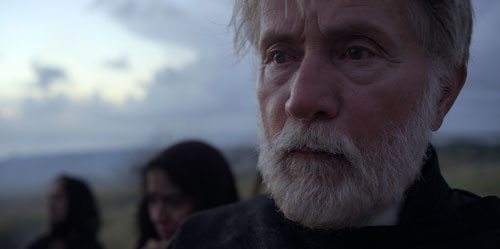
 A town frozen in perpetual mourning after a devasting natural disaster; a priest trying to coax them back to life without losing their favour; a lonely young man in need of direction but unable to follow his peers to the big city. There is a compelling story at The Vessel's center - the women of a small Latin American coastal village struggle to move on after a freak tsunami hits the town elementary school, washing forty-six children out to sea. Ten years later, Father Douglas (Martin Sheen, performing mostly in Spanish) is still struggling to convince the women to stop grieving and start having children again. All the town's women exclusively wear black, in remembrance of their loss. All except Fidelia, an eccentric stunned into a seeming state of dementia, but insistent on wearing pink. When Fidelia's son Leo, one of the last remaining young people in the town, falls into the ocean one night, he becomes an unlikely Christ figure and sparks a slow reawakening in the town. But change doesn't always come easily to small communities.
A town frozen in perpetual mourning after a devasting natural disaster; a priest trying to coax them back to life without losing their favour; a lonely young man in need of direction but unable to follow his peers to the big city. There is a compelling story at The Vessel's center - the women of a small Latin American coastal village struggle to move on after a freak tsunami hits the town elementary school, washing forty-six children out to sea. Ten years later, Father Douglas (Martin Sheen, performing mostly in Spanish) is still struggling to convince the women to stop grieving and start having children again. All the town's women exclusively wear black, in remembrance of their loss. All except Fidelia, an eccentric stunned into a seeming state of dementia, but insistent on wearing pink. When Fidelia's son Leo, one of the last remaining young people in the town, falls into the ocean one night, he becomes an unlikely Christ figure and sparks a slow reawakening in the town. But change doesn't always come easily to small communities.
Writer and director Julio Quintanais more interested in visual flair, a sense of mystery and enigmatic moments than in depth of character and narrative clarity; and he almost gets away with it. His roaming handheld camera, heavy use of voiceover (alternated with silence), spiritual themes and allegorical overtones may be emulating Terrence Mallick a bit too directly, but it's hard to fault the enthusiasm and sincerity.
There are some interesting touches, like the Vessel of the title, a sense of detached inevitability to the way things unfold, and just a touch of magic realism. The emotional stakes, however, are never quite clear. The performances - though good - float by, like the cinematography, hooked only on a series of fleeting moments. When the film builds to its dramatic climax, it seems both rushed and somewhat contrived (an antagonist arises suddenly in the dawn of the final hour; the town's people are far too easily swayed, even by small town standards; Father Douglas loses hope in a moment after years of patient endurance).
Nevertheless, the film has an appealingly dreamy, sensual quality - floating through the narrative, the gorgeous locations, the folksy production design and the beautiful people with a deliberate eye. It poses some interesting questions on the nature of hope and the miraculous (are miracles just what we call narrowly averted tragedies?) but isn't overly interested in answering them, or probing far beyond their narrative or aesthetic value. What it does seem interested in is a sense of lyricism and visual poetry. And like any decent high school poetry, there's plenty to enjoy, but it's not quite as deep as it thinks it is.
There's a good movie in Julio Quintana's The Vessel, even if it doesn't quite make it to the surface. It hints at depths it never quite manages to tap into it. It favours visual flair over substance and almost gets away with it. There is originality in the story, and an endearing sincerity to the approach, but somehow the story is lost in the telling.